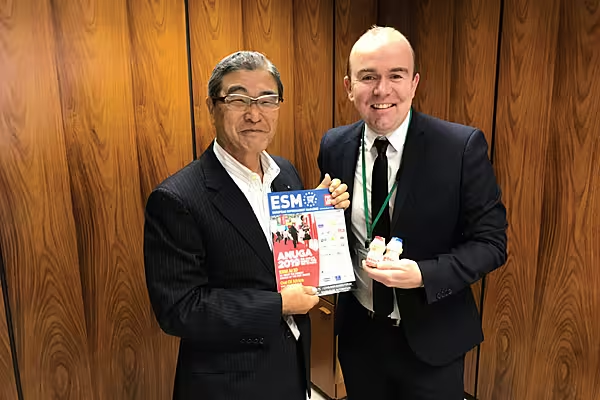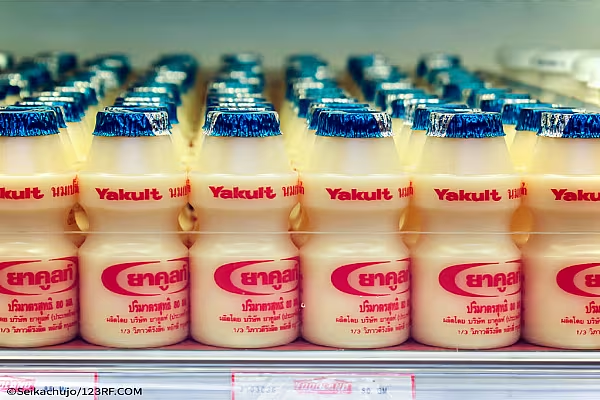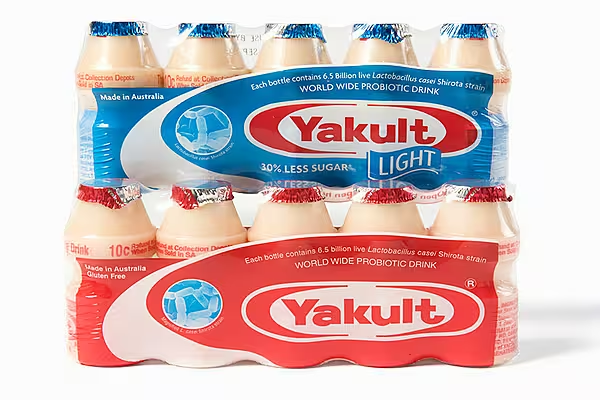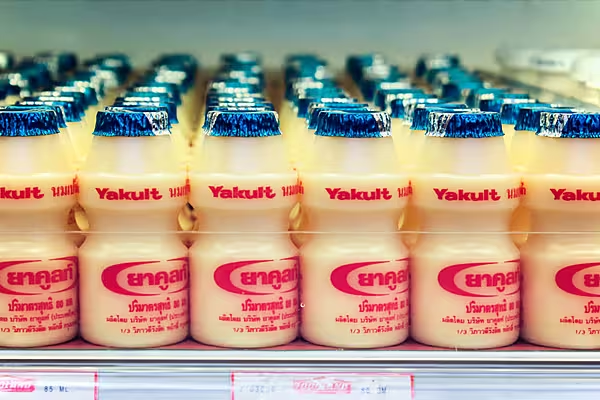In Japan, Yakult is more than just a cultured milk drink – it’s a part of the culture itself. Stephen Wynne-Jones travelled to Tokyo to meet Hiroshi Narita, senior managing executive officer at parent firm Yakult Honsha Co Ltd. This article first appeared in ESM Issue 6, 2019.
Ask a typical Western consumer to think of a famous Japanese brand, and they will inevitably conjure the names of countless technology or automotive firms – Honda, Mitsubishi, Panasonic, Toyota. Those partial to a tipple might also give the nod to drinks giants Asahi or Suntory.
But when it comes to the food sector, few brands from the Land of the Rising Sun have had as much impact as Yakult, a product that helped to develop consumer understanding about probiotics and pave the way for the current ‘gut health’ movement.
It is a brand rich in what the Japanese call ikigai – loosely translated as ‘what makes life worth living’ – which puts the well-being of its consumer base ahead of the need to satisfy shareholders’ thirst for profits.
Some 40 million bottles of Yakult are consumed per day around the world (470 per second), and in the 84 years since it was first developed by company founder Dr Minoru Shirota, the brand has expanded to 39 countries and regions (it launched in Europe in 1994), and it continues to expand.
As ESM discovered when we visited Yakult Honsha’s headquarters in the Higashi-Shinbashi district of Tokyo, as well as food products, the company is also synonymous with pharmaceuticals, cosmetics and even baseball – the Tokyo Yakult Swallows play just down the road, in Shinjuku.
Brand Positioning
According to Hiroshi Narita, senior managing executive officer at Yakult Honsha, while the current trend towards probiotics has certainly provided a sales boost – according to Euromonitor, the probiotics market was worth $30 billion in 2017 – Yakult has continued to remain true to its core beliefs, as espoused by Dr Shirota back in the 1930s.
“A lot of companies are now entering the probiotics market, and the competition is definitely increasing, but Yakult has been in the market for 84 years and has developed a reputation as a probiotic specialist,” Narita explains.
“We’ve expanded our business based upon three ideas, as determined by Dr Shirota.
“Firstly, instead of therapeutic medicine, let’s focus on preventive medicine. That is, instead of taking medicine after you become sick, let’s try to make our bodies stronger to prevent getting sick.
“Secondly, the intestinal tract is where you take nutrition through the body, so the idea is: if you can make this stronger, you will live a longer life. Lastly, it should be available at a price that anyone can afford, so as many people as possible can benefit from the product.”
Behind The Science
As any brand owner will tell you, any product is only as successful as the customer who purchases it, and as Yakult has grown, it has sought to increase the level of understanding about the science that underpins it.
The company operates a Yakult Central Institute in Tokyo (pictured in the panel above), as well as a research centre in Belgium, and it has published around 1,400 papers to date on the importance of probiotics and their effect on consumer health.
“When we first started the business, in 1935, there wasn’t really recognition that bacteria could be connected to health and well-being,” Narita explains. “We were able to create demand and get people to understand the benefits that probiotics can have on your health.
“Yakult is one of few companies that use words like ‘lactic acid bacteria’ in explaining our product. Other companies use terms like ‘cultures’. We spend a lot of time getting people to understand the product, and then experience it for themselves.”
Market Challenges
As with every global brand, there have been hiccups along the way – the company entered Argentina in 1997, but was forced to exit in 2001, due to an economic default – as well as restrictions on how Yakult can market its products. Its European business, for example, which saw sales rise by 4.0% last year, to ¥8.7 billion (around €72 million), faces strict regulation on the promotion of probiotics.
“The situation in Europe is kind of an exception,” Narita explains. “There’s a regulation in place on probiotic health claims, and if we go back and look at our entry into Europe in 1994, both Yakult and a number of other companies were promoting the fact that their products contained lactic acid bacteria. That gave rise to all sorts of product launches, such as ‘probiotic sausages’, so the government stepped in and introduced regulations over what you can and can’t say.”
What does help, however, is that, in an increasing number of European markets, such as the UK, Ireland and Italy, “there has been a very high level of research about probiotics, and people are very well researched on the subject, so there is a general positive attitude towards them. We hope that the EU will see this and become more flexible in terms of regulations.”
The spectre of Brexit, too, hasn’t gone unnoticed at Yakult, with Narita confirming that the brand is “not considering” leaving the UK, despite the logistics challenges that could arise in the event of a hard exit.
“We have a very strong business there,” he says. “Our products are produced in the Netherlands and imported into the UK and Ireland, so there is the possibility, after Brexit, that there will be customs concerns coming into play. That is obviously not desirable for us or our customers.”
Global Expansion
It’s potential hurdles such as these that have led Yakult to adopt a softly-softly approach to global expansion.
“When we’re entering a new country, we look at the purchasing power and the GDP per capita, we look at the distribution network, and we look at the cold chain that is in the market, as our product needs to be refrigerated,” says Narita, “but the one thing about health is that it has universal value. You want your parents to be healthy, you want your children to be healthy, you want your partner to be healthy. It’s a value that everyone understands, and it’s going to be present no matter which market you enter.”
As he explains, “a lot of decision-making” is granted to Yakult’s various offices around the world, however, with the company’s R&D element based in Japan, it adopts a methodical approach to new-product development in each of its markets.
“Currently, we are present in 40 countries and regions throughout the world,” Narita says, “but we feel there are many more markets we can go to, and many more people we can bring Yakult to. It does take time, however.”
Changing With The Times
For a company with more than eight decades of trading behind it, Yakult also understands the need to change with the times, and this starts with one of its core sales channels.
In 1963, Yakult introduced the concept of the Yakult Lady, essentially a door-to-door delivery service for the brand, which became synonymous with the brand.
As modern sales channels have developed – last year, Yakult developed a cashless order and delivery system, Yakult Delivery Net – so the role of the 34,000 or so Yakult Ladies in Japan (and around 47,000 overseas) has evolved from a brand-led service to a community-led service.
“Japan is well known for having an ageing population, probably the most ageing population in the world, so as part of their activities to contribute to society, the Yakult Ladies visit and check up on the elderly, and those who are living alone,” says Narita. “This is done in cooperation with the government. We also collaborate with approximately 800 local governments, police stations and other organisations across Japan and conduct crime watch activities, to contribute to the safety and well-being of local communities.”
Staying with corporate social responsibility, the fact that its products are packaged in small plastic bottles similarly hasn’t gone unnoticed, and Narita says that the company is focused on reducing waste.
“The plastics issue has become a global issue, and we take it very seriously,” he says. “In January, Yakult made an environmental declaration in Japan to further reduce the use of plastic and use more recycled plastic or biodegradable materials. In the EU, our product wrapping has changed from plastic to paper in the Netherlands, Germany, Austria, and soon in Belgium.”
Bright Future
As our meeting concludes – a couple of bottles of Yakult later – I discover that Mr Narita has been with the company for 45 years – a true ‘lifer’, in the traditional corporate sense. But when I ask him for a personal highlight of his time with the firm, he doesn’t single out a particular sales goal or winning a key contract. Rather, he references the impact that Yakult has had on society.
“One thing that has left an impression on me, particularly in Asia, is that there still a big gap between the rich and the poor,” he says. “If you want to have a private check-up in a state-of-the-art hospital, it costs you a lot of money. With that in mind, I’ve heard directly from people that Yakult has helped them in some way with their health, so that they don’t need to visit the hospital that much. I’m glad that I work for a company that can do that.”
The essence of ikigai, in other words.
© 2019 European Supermarket Magazine – your source for the latest retail news. Article by Stephen Wynne-Jones. Click subscribe to sign up to ESM: The European Supermarket Magazine














